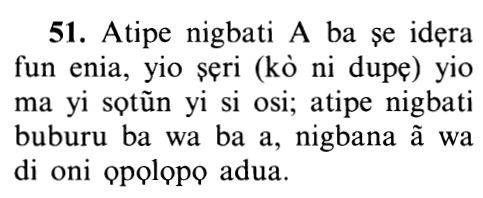41vs51
Select any filter and click on Go! to see results
Yoruba Translation

Hausa Translation
Kuma idan Muka yi ni´ima ga mutum, sai ya bijire, kuma ya nĩsantar da għfensa, kuma idan sharri ya sãme shi, sai ya zama ma´abũcin addu´a mai fãɗi.
Asbabu n-Nuzuul (Occasions of Revelation)
وَإِذَا أَنْعَمْنَا عَلَى الْإِنسَانِ أَعْرَضَ وَنَأى بِجَانِبِهِ ...
And when We show favor to man, he turns away and becomes arrogant;
means, he turns away from doing acts of obedience and is too proud to obey the commands of Allah.
This is like the Ayah:
فَتَوَلَّى بِرُكْنِهِ
But (Fir`awn) turned away along with his hosts, (51:39)
... وَإِذَا مَسَّهُ الشَّرُّ ...
but when evil touches him, (means, difficulties),
... فَذُو دُعَاء عَرِيضٍ ﴿٥١﴾
then he has recourse to long supplications.
means, he asks at length for one thing. Long supplications are those which are long on words and short on meaning. The opposite is concise speech which is brief but full of meaning.
And Allah says:
وَإِذَا مَسَّ الإِنسَـنَ الضُّرُّ دَعَانَا لِجَنبِهِ أَوْ قَاعِدًا أَوْ قَآئِمًا فَلَمَّا كَشَفْنَا عَنْهُ ضُرَّهُ مَرَّ كَأَن لَّمْ يَدْعُنَآ إِلَى ضُرٍّ مَّسَّهُ
And when harm touches man, he invokes Us, lying on his side, or sitting or standing. But when We have removed his harm from him, he passes on as if he had never invoked Us for a harm that touched him! (10:12)
" وإذا أنعمنا على الإنسان أعرض ونأى بجانبه " أي أعرض عن الطاعة واستكبر عن الانقياد لأوامر الله عز وجل كقوله جل جلاله " فتولى بركنه " " وإذا مسه الشر " أي الشدة " فذو دعاء عريض " أي يطيل المسألة في الشيء الواحد فالكلام العريض ما طال لفظه وقل معناه والوجيز عكسه وهو ما قل ودل وقد قال تعالى " وإذا مس الإنسان الضر دعانا لجنبه أو قاعدا أو قائما فلما كشفنا عنه ضره مر كأن لم يدعنا إلى ضر مسه " الآية .
"وإذا أنعمنا على الإنسان" الجنس "أعرض" عن الشكر "ونأى بجانبه" ثنى عطفه متبخترا , وفي قراءة بتقديم الهمزة "وإذا مسه الشر فذو دعاء عريض" كثير
يريد الكافر وقال ابن عباس : يريد عتبة بن ربيعة وشيبة بن ربيعة وأمية بن خلف أعرضوا عن الإسلام وتباعدوا عنه .
I'raab - grammatical analysis of the Qur'an
«وَإِذا» الواو حرف عطف وإذا ظرفية شرطية غير جازمة «أَنْعَمْنا» ماض وفاعله والجملة في محل جر بالإضافة «عَلَى الْإِنْسانِ» متعلقان بالفعل «أَعْرَضَ» ماض فاعله مستتر والجملة جواب شرط غير جازم لا محل لها «وَنَأى » معطوف على أعرض «بِجانِبِهِ» متعلقان بالفعل «وَإِذا» تقدم إعرابها «مَسَّهُ الشَّرُّ» ماض ومفعوله وفاعله «فَذُو» الفاء واقعة في جواب الشرط غير الجازم وذو خبر لمبتدأ محذوف مرفوع بالواو «دُعاءٍ» مضاف إليه «عَرِيضٍ» صفة والجملة الاسمية جواب الشرط لا محل لها
